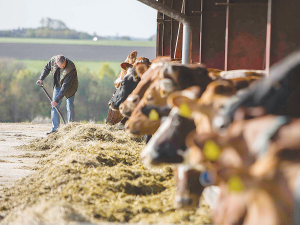DairyNZ chair wants cross-party deal
New DairyNZ chair Tracy Brown says bipartisan agreement among political parties on emissions pricing and freshwater regulations would greatly help farmers.
 Under the buy-out scheme, the Government will buy the businesses of Dutch livestock farmers who are categorised as ‘regular’ or ‘peak’ polluters.
Under the buy-out scheme, the Government will buy the businesses of Dutch livestock farmers who are categorised as ‘regular’ or ‘peak’ polluters.
While New Zealand seems to be treading water on the subject of pricing emissions and the future of He Waka Eke Noa (HWEN), pending a new government, the Netherlands has been clearer on its proposed farm buy-out scheme, as part of its effort to reduce nitrogen emissions by at least 55% by 2030.
However, negotiations to reach an overall agreement on the future of the Dutch agricultural sector broke down in mid-2023. The government spearheading the process has since dissolved, so while the voluntary buy-out scheme is now available for farmers, it will be up to a future government to devise new, additional measures should this not be enough to meet reduction targets.
Under the buy-out scheme, the government will buy the businesses of Dutch livestock farmers who are categorised as 'regular' or 'peak' polluters.
The purchase price will be between 100 to 120% of the value of their business, with the farmer still able to retain the land. In return, those farmers must permanently reduce nitrogen emissions on the land by up to 85% and are not permitted to continue the farming business in the Netherlands or elsewhere within the European Union.
Looking at the scheme in more detail, following approval from the European Commission, the plan is to buy out livestock farms near protected nature areas, targeting two categories for farmers volunteering to be bought out. "Peak polluters" are set to receive 120% of the value of their business' while "regular polluters" will receive 100% of the value of their business.
There is a technical calculation to determine what category a farm falls into that includes total nitrogen leakage as well as proximity to protected nature areas. There is no published list as such, although it is understood that there are about 3,000 farms in the 'peak polluter' category and approxmately 8,000 farms in the 'regular polluter' classification.
In parallel to the farm buy out scheme, the government was also negotiating an Agricultural Agreement with the farming sector on its future in the Netherlands. A key sticking point concerned a proposed regulation to increase extensification of farming operations, in particular, the limit on the number of livestock per hectare.
Extensification refers to the process in which the same number of livestock is spread over a larger area of land, reducing the pressure on the farmland.
That pressure is driven by the amount of fertiliser used on the land, that in turn might leach into nearby rivers and creeks and have adverse effects.
When launched in June 2023, Dutch Minister for Nature and Nitrogen Christianne van de Wal warned farmers that "there will be no better offer hereafter".
A New Zealand dairy industry leader believes the free trade deal announced with India delivers wins for the sector.
The Coalition Government will need the support of at least one opposition party to ratify the free trade deal with India.
Primary sector leaders have welcomed the announcement of a Free Trade Agreement between India and New Zealand.
At Pāmu’s Kepler Farm in Manapouri, mating has wrapped up at the across-breed Beef Progeny Test.
More than 150 people turned up at Parliament recently to celebrate the 20th anniversary of Horticulture New Zealand (HortNZ).
Biosecurity New Zealand says Kiwis should continue to keep an eye out for yellow-legged hornets (Vespa velutina) over the holiday season.